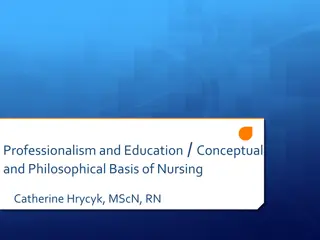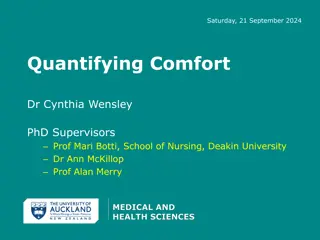Understanding Kolcaba's Theory of Comfort in Nursing
Kolcaba's Theory of Comfort focuses on enhancing the holistic outcomes for patients in the nursing process by prioritizing comfort, quality, and healing in physical, spiritual, social, and environmental aspects. The theory emphasizes maintaining calm, improving patient outcomes, and fostering relationships to deliver optimal healthcare quality.
Download Presentation

Please find below an Image/Link to download the presentation.
The content on the website is provided AS IS for your information and personal use only. It may not be sold, licensed, or shared on other websites without obtaining consent from the author. Download presentation by click this link. If you encounter any issues during the download, it is possible that the publisher has removed the file from their server.
E N D
Presentation Transcript
Kolcabas Theory of Comfort
Kolcabas Theory of Comfort Theory-Practice Gap a
Kolcabas Theory of Comfort Description of Theory, Research, and Practice Kolcaba s comfort theory has a key aim of increasing the holistic outcome for pat ients in the nursing process Has a key promotion on the quality that is delivered for healthcare by making so me key assumptions There is the desire for comfort
Kolcabas Theory of Comfort Description of Theory, Research, and Practice Ease - looks at maintaining calm when situation arises to increase performance Transcendence looks at the improve ment of patient outcomes in the process Context that comfort is delivered which i s for holistic healing - physical, the spirit ual, social or interpersonal, and the envir onment
Kolcabas Theory of Comfort Relationship among Assumptions Nurse has key focus on ensuring that o ptimum health is delivered to the patient Key focus on the promotion of good he alth (Kolcaba, 2006) Role of comfort in the delivery of psych ological aspect to the healing Research offers guidelines
Kolcabas Theory of Comfort Relationship among Assumptions Quality-focused relationship important p rinciple to follow Enabled by the physical, environmental, social, and spiritual well-being Combinations work to deliver on theory , practice, and research to identify the g aps and ways of addressing the quality i mprovement gaps in healthcare
Kolcabas Theory of Comfort Gaps in Literature Lack of practice standards Result from newness of the theory Improved by increasing the application of the theory through an academic focus Subjecting the theory to experimentatio n
Kolcabas Theory of Comfort Gaps in Literature Guidelines of practice determined to eq uip nurses with the technical skills Provision of the comfort theory for the p atient to receive holistic healing Institutions have the ability to develop t he necessary policies to ensure the emp loyees are able to deliver the necessary care of the delivery of holistic care.
Kolcabas Theory of Comfort Best Course of Action Have a focus on developing a hypothes is for the course of action Hypothesis can create an early determi nation of the possible solutions that can be presented for the problem Look into the right decision that should be made about the issue by developing a key hypothesis
Kolcabas Theory of Comfort Best Course of Action Ensuring that the decisions delivered ar e accurate by offering assistance Lack of precision that accompanies the situation Need to test the hypothesis to determin e the sanity of the actions to build on co nfidence to take the chosen direction wh ile allowing for alternatives
Kolcabas Theory of Comfort References Khan, A. A. (2017). Application of Katharine Kolkaba Comfort theory to nursing care of patient. International Journal of Scientific and Research Publications, 7(3): 104-108 Kolcaba, K. (2003). Comfort theory and practice: a vision for holistic health care and research. New York: Springer. Kolcaba, K., Tilton, C., Drouin, C. (2006). Comfort Theory. The Journal of Nursing Administrati on 36(11):538-544. DOI: 10.1097/00005110-200611000-00010 Lima, J. V. F., Guedes, M. V. C., Silva, L. F., Freitas, M. C., Fialho, A. V. M. (2016). Usefulness of the comfort theory in the clinical nursing care of new mothers: critical analysis. Rev Ga cha Enferm.;37(4):e65022. DOI: http://dx.doi.org/10.1590/1983-1447.2016.04.65022.























